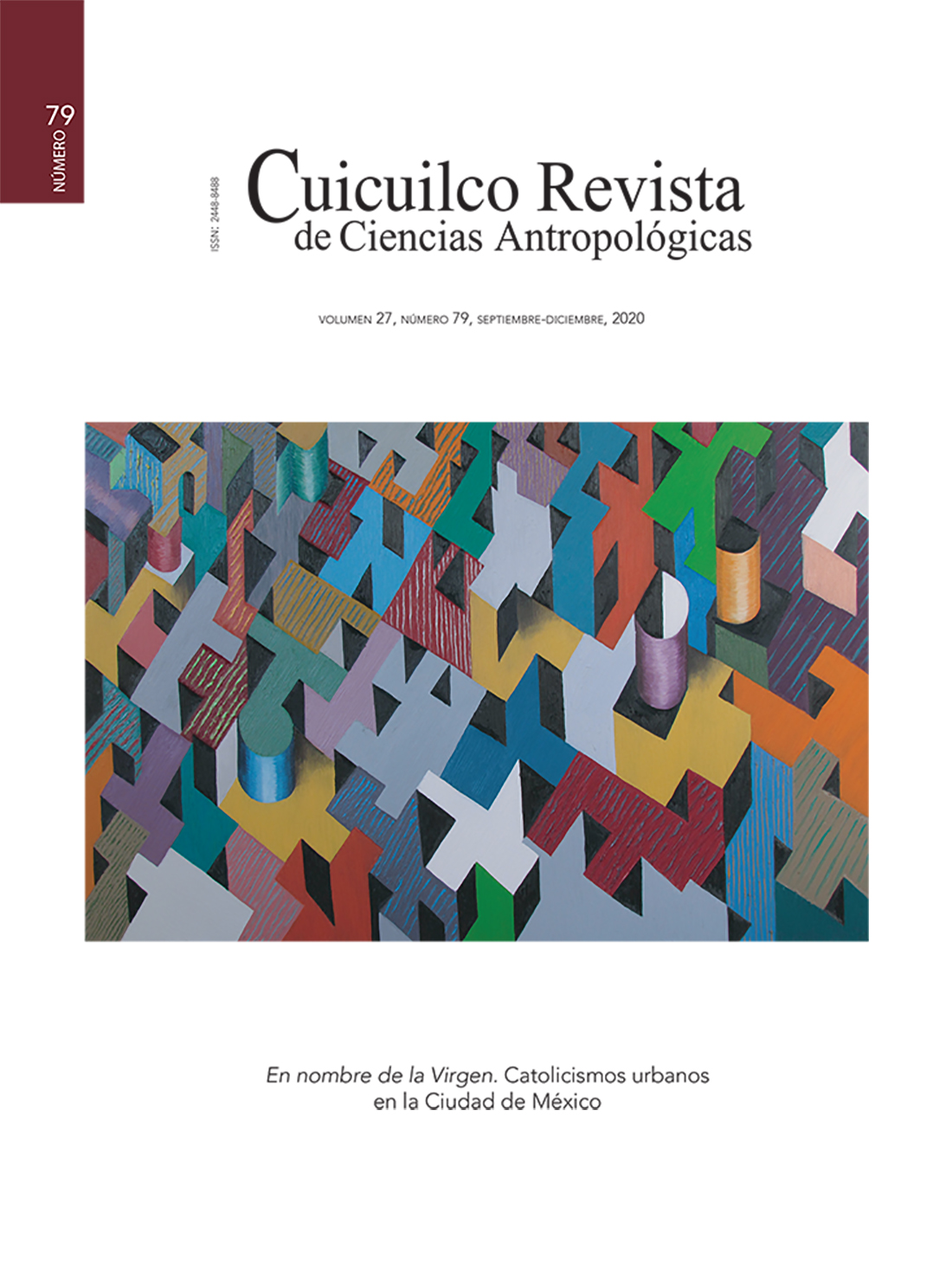They told me they saw you. : Rumor, fear and history in fieldwork
Published 2020-12-16 — Updated on 2021-04-26
Versions
- 2021-04-26 (2)
- 2020-12-16 (1)
Keywords
- Rumor,
- History,
- Fear,
- Narrative and truth
How to Cite
Abstract
In this paper I reflect on the risky situations that conditioned my field work in an indigenous community located in the Purépecha Plateau of the state of Michoacán (Mexico), and on the possibilities of telling what “really happened” in the history of that community; the political need to establish the truth became an element of dispute among some of the community members, thus placing me in conflictive situations. The concerns that I express in this article are endogenous, that is, the problem is ascertained through anthropology itself. For this reason, I categorize communication in three concepts: rumor, history and fear. The general questions are: What are the channels that the community members were looking for so as to have their narrative heard, displaced, validated and turned into truth, by engaging in actions that could endanger the ethnographer himself? What is the configuration of the place from where the discourse on the past is authorized and thus embodied in the production of history?
Downloads
References
- Antón Hurtado, Fina
- Antropología del miedo. Revista de ciencias sociales, 2 (2): 262-275.
- Balbuena Jara, Oscar
- Metodología y rapport. El monitoreo, el seguimiento y la investigación social en ámbitos de intervención del mecanismo nacional de prevención de la tortura. Estudios Paraguayos, XXXV (1): 277-300.
- De Certeau, Michel
- La escritura de la historia. Universidad Iberoamericana, Departamento de Historia. México.
- Derrida, Jacques
- La estructura, el signo y el juego en el discurso de las ciencias sociales, en La escritura y la diferencia. Anthropos. Barcelona: 383-401.
- Didi-Huberman, Georges
- Ante el tiempo. Historia del arte y anacronismo de las imágenes. Adriana Hidalgo. Buenos Aires.
- Espitia Betrán, Ingrid, Diana Ojeda y Claudia Rivera Amarillo
- La princesa antropóloga: disciplinamiento del cuerpo feminizado y método etnográfico. Nómadas, La escritura de la historia, 51: 99-115.
- Flores Martos, Juan Antonio
- Trabajo de campo etnográfico y gestión emocional: notas epistemológicas y metodológicas. Universidad de Castilla-La Mancha.
- Goldstein, Daniel
- Qualitative Research in Dangerous Places: Becoming an “Ethnographer” of Violence and Personal Safety, Drugs, Security and Democracy Program, Working Papers on Research Security, núm. 1, Social Science Research Council. https://www.ssrc.org/pages/qualitative-research-in-dangerous-placesbecoming-an- ethnographer-of-violence-and-personal-safety Consultado el 2 de junio de 2017.
- Guevara Sánchez, Brenda Griselda
- Comunidad y Conflicto: Zirahuén (1882-1963). UMSNH. Morelia, Michoacán.
- Cuando dejamos de ser libre. Recuperación y defensa del territorio: procesos históricos de formación de la comunidad indígena de Zirahuén, 1963-1986. El Colegio de Michoacán. Zamora, Michoacán.
- Discursos en disputa por la “verdadera” historia de la comunidad indígena de Zirahuén y la producción de conocimiento histórico-antropológico, tesis. El Colegio de Michoacán. Zamora, Michoacán.
- Hjorth Boise, Susann Vallentin
- Evaluación y reducción de riesgo en trabajo de campo. Alteridades, 28 (58): 73-84.
- Martin-Ortega, Olga y Johanna Herman
- There and Back. Surviving Field Research in Violent and Difficult Situations, en Surviving Field Research. Working in Violent and Difficult Situations, Chandra Lekha Sriram, John C. King, Julie A. Mertus, Olga Martin-Ortega y Johanna Herman (eds.), Routledge, Nueva York: 227-241.
- Nordstrom Carolyn y Antonius C. G. M Robben
- Fieldwork under Fire: Contemporary Studies of Violence and Survival. University of California Press.
- Paz, Alejandro
- The Circulation of Chisme and Rumor: Gossip, Evidentiality, and Authority in the Perspective of Latino Labor Migrants in Israel. Journal of Linguistic Anthropology, 19 (1): 117-143.
- Ricoeur Paul
- Del texto a la acción. Ensayos de hermenéutica II. Fondo de Cultura Económica. México.
- Rufer, Mario
- La memoria de los otros: Subalternidad, poscolonialismo y regímenes de verdad. REAUS-Revista de estudios Antiulitaristas e Poscoloniales, 1 (1): 1-27.
- El habla, la escucha y la escritura. Subalternidad y horizontalidad desde la crítica poscolonial en Sarah Corona Berkin y Olaf Kaltmeier, en En diálogo. Metodologías Horizontales en Ciencias Sociales. Gedisa. México.
- Scott, James
- Domination and the arts of resistance: Hidden transcripts. Yale University Press.
- Shoshan, Nitzan
- Más allá de la empatía: la escritura etnográfica de lo desagradable. Nueva Antropología, XXVIII (83): 123-146.
- Sluka, Jeffrey
- Participant Observation in Violent Social Contexts. Human Organization, 49 (2): 114-126.
- Spivak, Gayatri Chakravorty
- ¿Puede el subalterno hablar? Revista Colombiana de Antropología, (39) enero-diciembre: 297-364.
- Stavenhagen, Rodolfo
- Etnografía activista: mi experiencia en la ONU. Nueva Antropología, XXVIII (83): 13-24.
- Tamayo y Tamayo, Mario
- El proceso de la investigacio?n cienti?fica. Limusa. México.
- Vázquez León, Luis
- Multitud y distopía. Ensayos sobre la nueva condición étnica en Michoacán. UNAM. México.
- Warner, Michael
- Público, públicos, contrapúblicos. Fondo de Cultura Económica. México.
- White, Hayden
- Narrativas, discurso y representaciones históricas. Paidós Básicos. Barcelona.
- Yeh, Rihan
- La calle es un río: el público de los (narco) corridos como el pueblo. Revista Colombiana de Antropología, 51 (1): 79-107.

